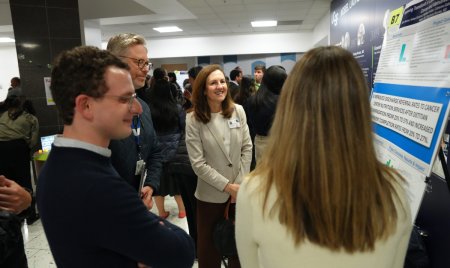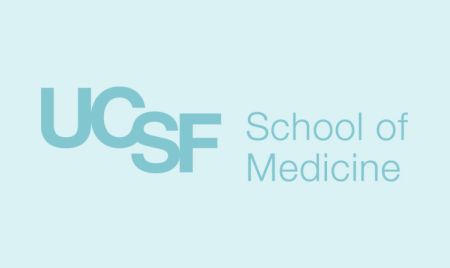Inquiry Symposium 2020: Preparing for a Career of Discovery

Researcher holds a pipette
The Inquiry Symposium convened online for the first time on April 29, 2020 due to the COVID-19 pandemic. This physically-distant Zoom option might have presented challenges to others, but these were easily met and overcome by the Class of 2020 – pioneers of the Bridges Curriculum and the scholarly research requirement at UCSF. As a culminating event, the Symposium was an incredible showcase of the variety of ways students are capable of progressing medical knowledge, clinical tools, and discovery during the four-year curriculum. Featured keynote speaker Alexis Beatty, MD, MS recognized these competencies from her vantage point:
“As doctors, we have to adapt over time to improve care for our patients. I see both potential for immense positive impact and great work that is ahead of us.”
Alexis Beatty, MD, MS
Associate Professor in Residence, UCSF Department of Epidemiology & Biostatistics
A cardiologist and researcher who studies innovative delivery models for cardiovascular disease care, Dr. Beatty emphasized the vital role of inquiry in the careers of 21st century physicians:
“Digital technology has already changed health and health care, but a lifetime of inquiry is ahead of us to determine where and how digital technologies can positively benefit health.”
In her time working for Apple, Dr. Beatty realized the immense potential of mobile devices to benefit cardiovascular health. A corporate study screening for atrial fibrillation using wearable devices could screen over 400,000 patients in under a year, producing a wealth of data. However, such a study may produce anxiety-inducing false positives for younger patients at low risk, or increase costs for unnecessary testing in older patients. Dr. Beatty underscored the importance of inquiry for physicians to interpret such evolving technologies, and address issues related to disparities in access:
Inquiry is an essential element of medicine, medical education, and life, according to Dr. Rita Redberg, Director of the Inquiry Curriculum. At the event, she awarded winners of the competitive Dean’s Prize and Deep Explore Award and commended all students on their accomplishments:
“Inquiry by graduating students has added to our ever-expanding body of scientific knowledge. We hope the experiences you have had as part of the inquiry curriculum will inform you for a lifetime of inquiry and innovation.”
Rita Redberg, MD
Director, Inquiry Curriculum
Dr. Redberg highlighted how participating in self-directed research and scholarship as students can transform the way clinicians consolidate and utilize knowledge to serve patients.
Dean’s Prize and Deep Explore Prize Winners
The Dean’s Prize and Deep Explore Award winners spanned a breadth of topics, including projects on improving the referral system for hypertension care in Western Kenya (Max Pillsbury), assessing a novel food support program for people living with HIV in rural California counties (Linda Yu), and developing a novel combination immunotherapy for glioblastoma (Alexander Haddad).
Through their final Inquiry Deep Explore projects, these graduating students made meaningful and transformative contributions to a number of fields that have directed their developing careers in medicine.
Max Pillsbury shared that his project aligned the needs of patients with rural providers to help patients reach referral appointments for hypertension, which is the leading risk factor for cardiovascular disease (CVD). With 25% of Kenyans experiencing uncontrolled blood pressure, the goal of Max’s project was to help ease the immense burden of CVD in western Kenya. His intervention is now being tested in a 3-year cluster randomized controlled trial to evaluate change in blood pressure and cardiovascular risk. Max’s inquiry experience deeply motivated him to address global cardiovascular disease through community-based solutions, and he hopes to help develop pragmatic solutions for underserved populations around the world as a physician.
Alexander Haddad’s work focused on producing a novel immunotherapy approach for glioblastoma (GBM), the most common primary malignancy of the brain that still has a median survival of only 15 months. Alexander showed significant survival improvement in mice models with GBM using injected neural stem cells and retroviruses to induce improved immune response to GBM, offering promise to improve therapeutic options for patients with GBM. Alexander Haddad used his inquiry experience to confirm and further his aspiration to become an academic neurosurgeon, with hopes of applying synthetic biology and gene therapy to neurosurgical conditions.
Below is the full list of Dean’s Prize, Deep Explore Prize, And Mentor Prize Winners:
Dean’s Prize Award Winners
Mary Kathryn Abel
Mentor: Rita Mukhtar, MD, (Surgery)
“Clinical Outcomes after Standard Interventions in Invasive Lobular Carcinoma of the Breast”
Eva Gills-Buck
Mentor: Tippi MacKenzie, MD, (Surgery)
“Maternal AIRE+ Cells Support Healthy Pregnancy”
Alexander Haddad
Mentor: Manish Aghi, MD, PhD, MAS (Neurological Surgery)
“Developing a Novel Combination Immunotherapy for Glioblastoma Using Synthetic Biology and Gene Therapy”
McKinsey Pillsbury
Mentor: Priscilla Hsue, MD (Medicine)
“Integrating Peer Support and Health Information Technology to Facilitate Hypertension Referrals in Western Kenya: Empowering Community Perspectives through Human-Centered Design”
Linda Yu
Mentor: Kartika Palar, PhD (Medicine)
“Assessing the Outcome and Implementation of the Food Access Pilot Project: An Evaluation of a Novel, Medically-Appropriate Food Support Program for People Living with HIV in Rural California Counties”
Deep Explore Prize Winners
Martin Consunji
Mentor: Jennifer Babik, MD, PhD (Medicine)
“Evaluation of a Longitudinal Subspecialty Clinic for Internal Medicine Residents”
Nathan Kim
Mentor: Colette Auerswald, MD, MS (Global Health Sciences)
“Analyzing U.S. Tweets for Stigma against People Experiencing Homelessness”
Omar Mesina
Mentor: Malini Nijagal, MD, MPH (Obstetrics and Gynecology)
“Feasibility and Business Case of a Mobile Health Clinic for Pregnancy Care Services for Publicly-Insured People in San Francisco”
Lee Seligman
Mentor: Karen Hauer, MD, PhD (Medicine)
“From Grading to Assessment for Learning: A Qualitative Study of Student Perceptions Surrounding Elimination of Core Clerkship Grades”
Jordyn Silverstein
Mentor: Neil Mehta, MD (Medicine)
“National Experience with Living Donor Liver Transplant (LDLT) for Hepatocellular Carcinoma (HCC)”
Hannah Stone
Mentor: Marissa Raymond-Flesch, MD, MPH (Pediatrics)
“Characteristics of Oral Emergency Contraception Prescribing in an Urban, Academic Adolescent and Young Adult Clinic”
Mentor Award Recipients
Colette Auerswald, MD, MS (Global Health Sciences)
Mentee: Nathan Kim
Jennifer Babik, MD, PhD (Medicine)
Mentee: Martin Consunji
Benjamin Breyer, MD, MAS (Urology)
Mentee: Anas Tresh
Rita Mukhtar, MD (Surgery)
Mentee: Mary Kathryn Abel
Andreas Rauschecker, MD, PhD (Radiology)
Mentee: Carol Tran
Congratulations to all graduating students on their work in inquiry and future careers full of discovery!
Watch the full Inquiry Symposium video here:
 Daniel Cummins is a first-year medical student at UCSF. Daniel graduated in 2019 from the University of Southern California with a degree in biomedical engineering. His passions include biomedical research and writing. In the future, he hopes to work in patient care and research as a physician-scientist.
Daniel Cummins is a first-year medical student at UCSF. Daniel graduated in 2019 from the University of Southern California with a degree in biomedical engineering. His passions include biomedical research and writing. In the future, he hopes to work in patient care and research as a physician-scientist.









